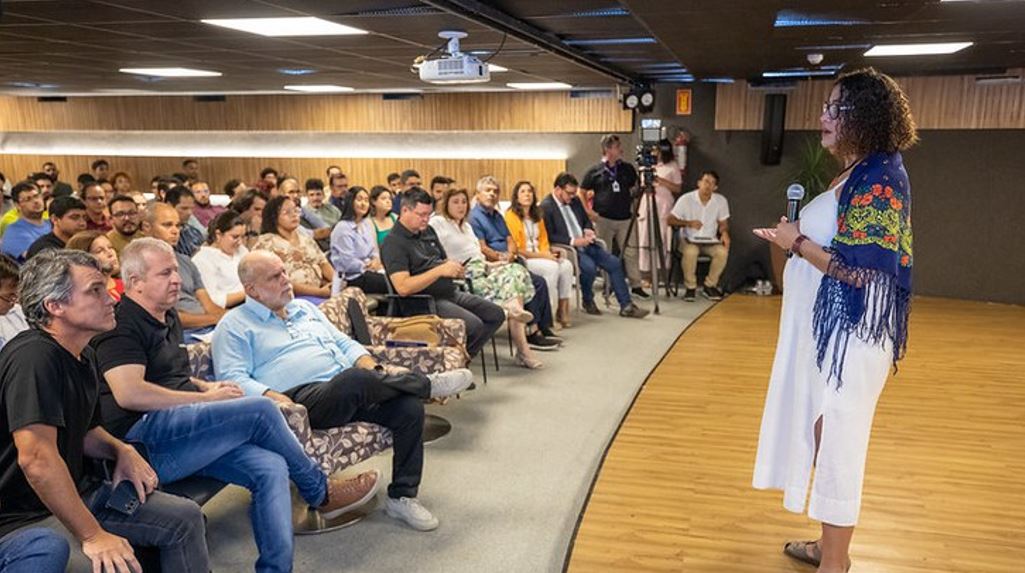The minister participated, in Recife, in the graduation of 410 students from the Accelerated Training in Programming (FAP), carried out by Softex, with resources from MCTI

Photo: Diego Galba (ASCOM/MCTI)
The Minister of Science, Technology and Innovation, Luciana Santos, announced, on Friday (26), the expansion of the ICT Residency program, which should open, later this year, 40 thousand new vacancies to train human resources in the areas of Technologies of Information and Communication across the country. The news was given in Recife, during the graduation of 410 students from the program.
“We are going to scale this initiative, we are going to open 40 thousand vacancies throughout Brazil. And this is what is very important: anyone, finishing high school, or in the last year of high school, will be able to access these courses – which are free – and can become a programmer, a software developer”, said the minister, during the ceremony.
The ICT Residency program, implemented by MCTI with resources from the ICT Law, has already reached 62 thousand people from different regions of the country, with training to work in areas such as cloud computing, Big Data, Cyber Security, Internet of Things, Manufacturing Advanced robotics and Artificial Intelligence.
So far, R$ 730 million has been approved by the ministry for the program, which is carried out in 38 research institutes and universities across Brazil, and has partnerships with more than 200 companies in the ICT sector.
The young people who graduated this Friday are from cities in Pernambuco, Paraíba and Rio Grande do Norte. They were part of the second class of the Accelerated Training in Programming (FAP), which is carried out by Softex with resources from the Ministry's ICT Residency program. In total, MCTI will invest R$8.6 million in the three phases of the FAP, to train 1,500 young people from these states.
With this new class, there are now 640 students who have completed this training process in Front End Developer and Back End Developer. FAP is expected to open registrations for its third class in April. To participate, you must be over 18 years old and have completed high school.
The objective of the training is not only to train, but to allocate young people to partner companies that join the program. In this sense, part of the resources is destined to pay for Insertion Scholarships. From February onwards, students will be sent to these companies, with a grant of R$600, for a three-month residency, combining practical and theoretical knowledge.
The minister also announced something new: the idea is that, with the opening of these 40 thousand new vacancies, in addition to the insertion grant, students will start to receive, already in the training stage – which lasts six months – a grant of R$200, for encourage entry.
“The idea is to provide qualified labor for the Information Technology sector, in one of the most dynamic chains in our economy, which, today, suffers from a deficit of professionals, estimated at 100 thousand per year. And, at the same time, generate opportunities for young Brazilians. These are professions that permeate everything that is the production chain, from agriculture to health”, said Luciana.
The reinforcement of the program takes place in a context in which an IBGE survey showed that one in five young people, between 15 and 29 years old, would not study or work in 2022.
Accelerated Training in Programming allows these students to be trained in 24 weeks, with a total of 324 hours, 180 of which in distance learning mode and 144 hours of in-person classes. The execution methodology is based on identifying challenges to be posed by partner companies and developing a solution for them.
The president of Softex, Yves Nogueira, highlighted that the FAP gives young people who have not yet been able to access a degree the opportunity to enter the job market. He, who was a public school student, was moved when talking about the importance of offering free training to so many people. “This has to be available to any citizen, regardless of class or family income level. And that's what we're doing. I was a public school student, I had this right, and it is important to extend this right to everyone”, he said.
One of the FAP graduates, Amanda Chaves, highlighted the relevance of the graduation. “This moment is very important for us, students, and also for those who organize this event, because it ends up validating that education transforms lives and that FAP has actually worked”, he argued.
It was believed in the transformative potential of the training that student José Carlos Gonçalves found the time and encouragement to complete the course. At 26 years old, he works as an app delivery person and lives more than 10 kilometers away from where he takes classes.
“It's very exhausting having to study while working, because I have to cycle a lot every day to make a considerable income and support myself. But I believe that this effort will be rewarded, recognition is coming. This event today is an example. Being here, in this world of technology, surrounded by such fantastic people is already a reward. I will start the residency and do my best to continue in this area and complete this career transition”, he projected.













